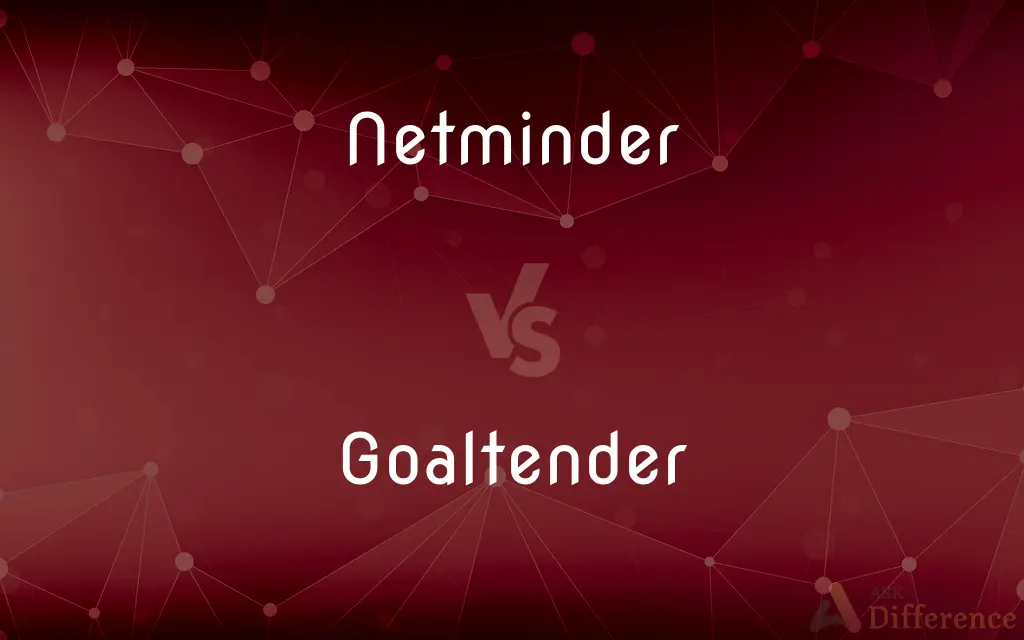Netminder vs. Goaltender — What's the Difference?
Edited by Tayyaba Rehman — By Maham Liaqat — Updated on March 27, 2024
A netminder is a colloquial term for a player responsible for guarding the goal in sports, notably hockey, while a goaltender is the official term for this position, emphasizing the role's defensive responsibilities.

Difference Between Netminder and Goaltender
Table of Contents
ADVERTISEMENT
Key Differences
Netminder is a casual term often used in hockey to describe the player whose primary role is to prevent the opposing team from scoring by guarding the goal. On the other hand, goaltender is the formal term used in the rules of the sport, highlighting the player's position and duties on the ice. Both terms refer to the same position but carry different connotations regarding formality and context in which they are used.
While netminder is a term favored in casual conversations among fans and players, reflecting a more laid-back approach to discussing the sport, goaltender is used in official documents, broadcasts, and analyses, signifying a more professional and technical perspective on the role.
The choice between netminder and goaltender can also reflect cultural preferences, with "netminder" being more commonly used in certain regions or by specific hockey communities, whereas "goaltender" is universally understood and accepted across all levels of the sport, from amateur to professional leagues.
In coaching and training contexts, the term "goaltender" might be preferred to emphasize the technical aspects of the position, including skills and strategies specific to goalkeeping. Meanwhile, "netminder" might be used more informally, such as in locker room talks or casual discussions about game performance.
Despite the differences in usage, both terms underscore the importance of the role in hockey, with the player being crucial for defense, often making the difference between winning and losing through their ability to block shots and anticipate the opposing team's moves.
ADVERTISEMENT
Comparison Chart
Formality
Informal term.
Official term.
Usage Context
Casual conversations, among fans and players.
Official documents, broadcasts, analyses.
Cultural Preferences
More common in certain regions or communities.
Universally understood and accepted.
Emphasis
Casual reference to the role.
Emphasizes the technical and defensive responsibilities.
Coaching and Training
Used informally.
Preferred to highlight technical skills and strategies.
Compare with Definitions
Netminder
Reflects a laid-back approach to the position.
They're looking for a new netminder to strengthen the defense.
Goaltender
Emphasizes the importance of technique and strategy.
Training a young goaltender involves both physical and mental preparation.
Netminder
Indicates the person's role without formal terminology.
A good netminder is key to a team's success.
Goaltender
The official term for the player positioned at the goal to prevent scores.
The goaltender has the lowest goals against average in the league.
Netminder
Often used in casual, fan-centric discussions.
Our netminder has been unstoppable this season.
Goaltender
Recognized in official rules and documents.
The league's best goaltender award went to...
Netminder
May vary in popularity by region or community.
In our club, everyone prefers to say netminder.
Goaltender
Highlights the defensive responsibilities of the position.
A skilled goaltender can control the flow of the game.
Netminder
A colloquial term for a hockey player who guards the goal.
The team's netminder made impressive saves last night.
Goaltender
Used in professional and technical contexts.
The team announced a new contract for their starting goaltender.
Netminder
A goalkeeper
The puck might go between the netminder's pads
Goaltender
In ice hockey, the goaltender (colloquially known as the goalie) is the player responsible for preventing the hockey puck from entering their team's net, thus preventing the opposing team from scoring. The goaltender usually plays in or near the area in front of the net called the goal crease (often referred to simply as the crease or the net).
Netminder
See goalkeeper.
Goaltender
A goalkeeper, especially in ice hockey.
Netminder
A goalkeeper or goaltender.
Goaltender
See goalkeeper.
Netminder
The soccer or hockey player assigned to protect the goal
Goaltender
(sports) a designated player that attempts to prevent the opposing team from scoring by protecting a goal.
Goaltender
The soccer or hockey player assigned to protect the goal
Goaltender
The defensive position on an ice hockey or soccer or lacrosse team who stands in front of the goal and tries to prevent opposing players from scoring
Common Curiosities
What are the key responsibilities of a goaltender?
A goaltender's key responsibilities include blocking shots, anticipating opponents' moves, and directing team defense from their position.
What equipment is essential for a goaltender?
Essential equipment includes a helmet with a face cage, leg pads, a blocker, a catch glove, and a chest protector.
Are netminder and goaltender terms interchangeable?
Yes, they refer to the same position in hockey, though "goaltender" is more formal and "netminder" is more colloquial.
Why might someone use the term netminder instead of goaltender?
"Netminder" might be used for a more casual, informal reference to the goaltending position, often reflecting cultural or regional preferences.
Can the term netminder be used in official hockey documents?
Typically, "goaltender" is preferred in official documents for clarity and consistency across the sport.
Why is mental toughness important for goaltenders?
Mental toughness is crucial for dealing with the pressure of the role and quickly recovering from mistakes or conceded goals.
What is a netminder?
A netminder is an informal term for the hockey player responsible for guarding the goal against opposing team scores.
Is there a difference in the skills required for a netminder vs. a goaltender?
No, the skills required are the same; the difference lies in the terms used to describe the position, not the skills or responsibilities.
What is a goaltender?
A goaltender is the official term for the player in hockey whose primary role is to defend the goal to prevent the opposing team from scoring.
What impact does a goaltender have on a hockey game?
A skilled goaltender can significantly influence the outcome of a game by preventing goals and making key saves.
How does one become a successful goaltender?
Success as a goaltender requires rigorous training, excellent reflexes, strategic thinking, and a deep understanding of the game.
How do goaltenders communicate with their team?
Goaltenders communicate through shouts, hand signals, and by directing players during defensive setups and plays.
What is the biggest challenge faced by goaltenders?
The biggest challenge is consistently performing under pressure and adapting to the fast pace and unpredictability of the game.
How can a team support their goaltender?
Teams can support their goaltender by maintaining strong defense, limiting high-quality shots, and following the goaltender's lead in defensive plays.
How do goaltenders prepare for games?
Preparation involves studying opponents, practicing specific saves, and mentally visualizing game situations.
Share Your Discovery

Previous Comparison
Sat vs. Set
Next Comparison
Laugh vs. GiggleAuthor Spotlight
Written by
Maham LiaqatEdited by
Tayyaba RehmanTayyaba Rehman is a distinguished writer, currently serving as a primary contributor to askdifference.com. As a researcher in semantics and etymology, Tayyaba's passion for the complexity of languages and their distinctions has found a perfect home on the platform. Tayyaba delves into the intricacies of language, distinguishing between commonly confused words and phrases, thereby providing clarity for readers worldwide.













































